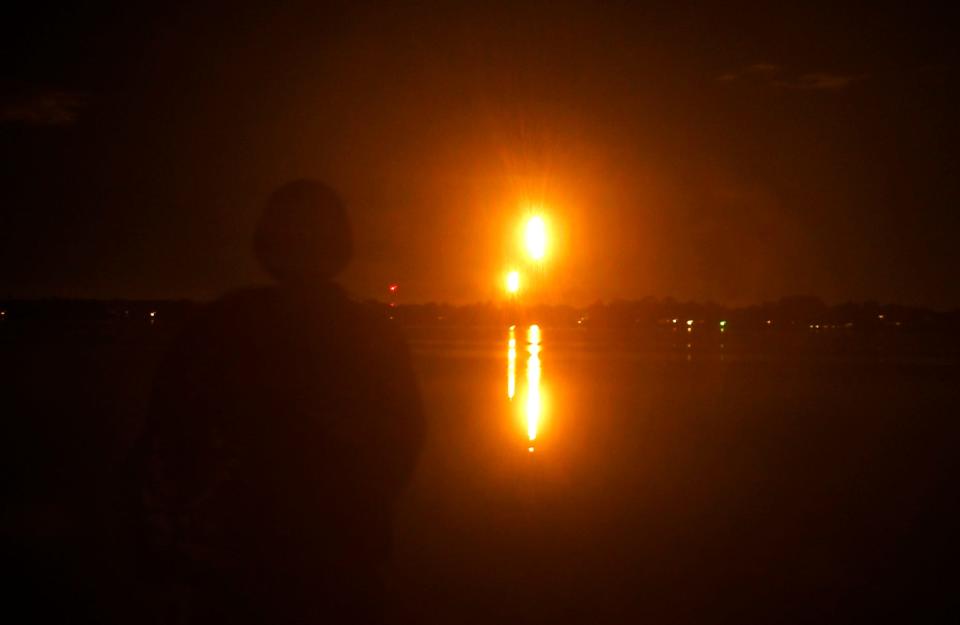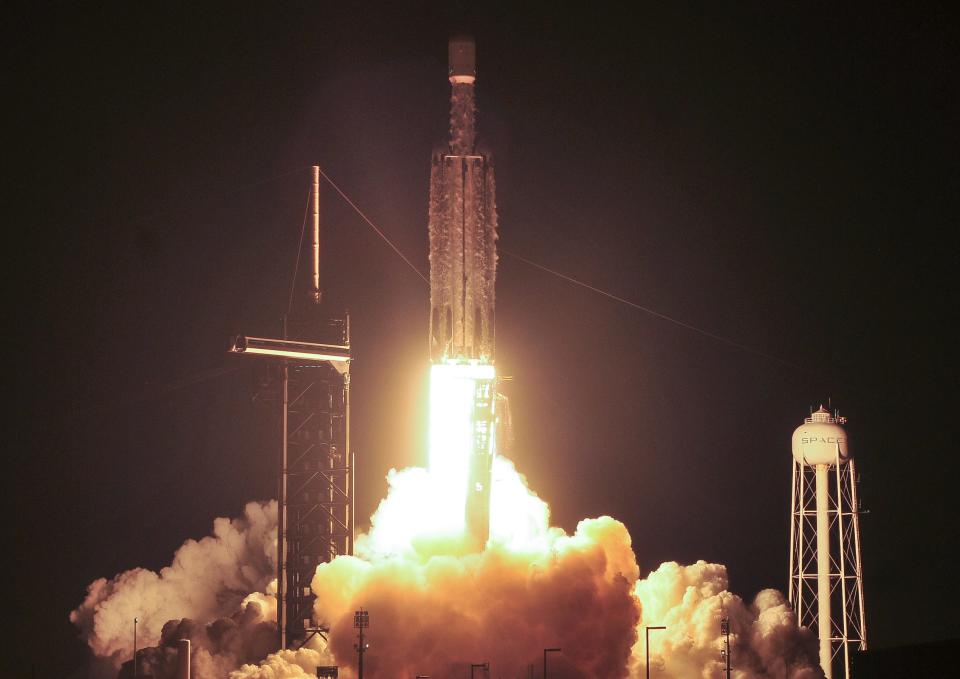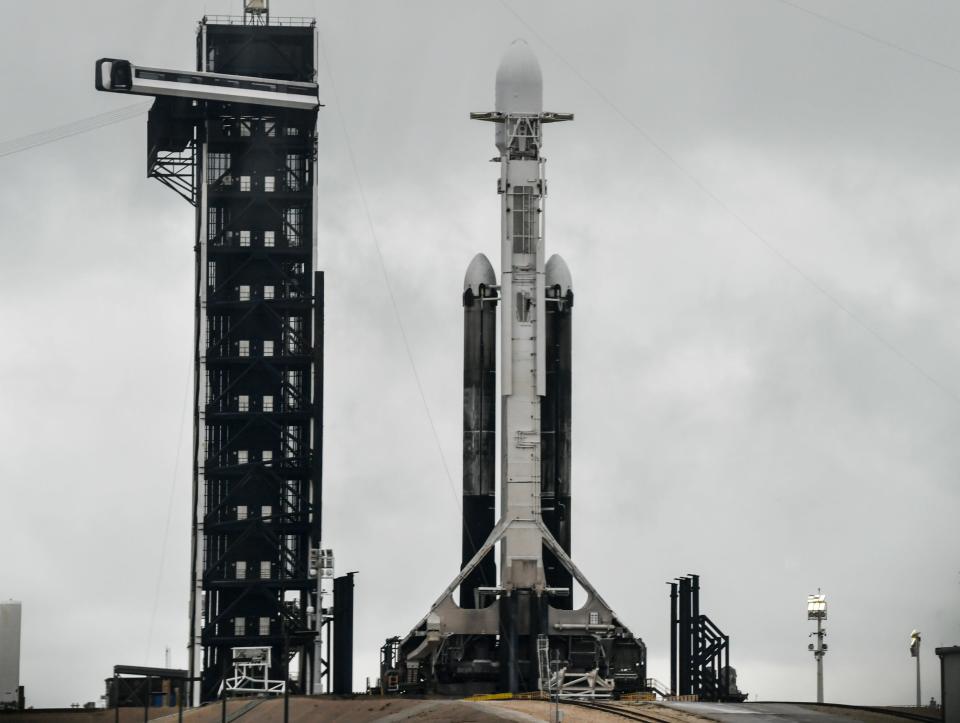SpaceX doubleheader: Falcon Heavy, Falcon 9 soar back-to-back, marking 72 launches in 2023
During a crisp, spectacular evening for spectators and photographers, SpaceX crews launched a Falcon Heavy triple-core rocket followed by a Falcon 9 rocket within a 2-hour, 54-minute span Thursday night from Cape Canaveral, capping a record-shattering year.
The SpaceX doubleheader marked the 71st and 72nd orbital launches of 2023 from NASA's Kennedy Space Center and neighboring Cape Canaveral Space Force Station. That eclipses the previous record of 57 launches, which was established last year.
"We truly are the Space Coast," said Winston Scott, a NASA astronaut who spent more than 24 days in space as a mission specialist aboard shuttles Endeavour in 1996 and Columbia in 1997.
All viewing tickets sold out for the 8:07 p.m. EST Falcon Heavy launch at the KSC Visitor Complex, spokesperson Rebecca Burgman said. By dinnertime, variable message boards along NASA Parkway West informed motorists "Presold Tickets Only" and "At Capacity."
"There's definitely a huge interest, obviously, in seeing a launch. It is that kind of bucket-list experience for a lot of people who probably were here visiting Orlando or other areas of Central Florida," Burgman said shortly before the huge rocket soared off pad 39A at KSC.
Hundreds of launch spectators — many with hands jammed into coat pockets to stay warm in 58-degree evening weather — sat in metal bleachers at the visitor complex's North Atlantis Lawn viewing area. A key attraction: The Falcon Heavy's two side boosters were scheduled to descend and land at Cape Canaveral Space Force Station, triggering window-rattling sonic booms.
"Now folks, you're going to look at that and say, 'That's CGI. That's all fake' — and you're going to be looking at it with your own eyes," commentator Bill Schafer told the crowd over loudspeakers.
"But you'll hear the sonic boom. You'll hear the roar of the engine. This is beautiful weather for this. Good Lord willing, we'll be able to have an amazing launch. And then about 8? minutes into the flight, (they'll) be landing. And you'll just be amazed," Schafer said.
The Falcon Heavy lifted the Space Force's X-37B Orbital Test Vehicle "mini-shuttle" robotic space plane into orbit on the USSF-52 national security mission. This marks the secretive vehicle's seventh classified mission.
"The OTV payload will conduct tests that include operating the reusable space plane in new orbital regimes, experimenting with future space domain awareness technologies, and investigating the radiation effects on materials provided by NASA," Jessie Anderson, a SpaceX production and engineering manager, said during the launch webcast.
Scant information is publicly known about the Boeing-built space plane's classified activities. The X-37B spent a record 908 days in low-Earth orbit before ending its last mission in November 2022 and touching down at KSC's Launch and Landing Facility.
Indeed, "at our customer's request," Anderson announced SpaceX would not broadcast views of the rocket's second stage during the launch webcast.

“A lot of the details about it are unknown to us, because it's all classified. But it’s been an incredibly successful vehicle, as far as we can tell,” Scott said of the X-37B. The Melbourne resident previously embarked on three spacewalks totaling 19 hours, 26 minutes.
“But another thing that's important about this one is, it’s the first time this Space Force plane is launching on a (Falcon Heavy) rocket. So you've got a military vehicle being launched on a private civilian, or commercial, rocket," Scott said.
“SpaceX is doing a great job at providing us alternatives to space. Alternatives other than NASA, other than the Space Force, other than ULA, and so on. So that’s really good,” he said.
In a Friday morning press release, Brig. Gen. Kristin Panzenhagen, who commands Space Launch Delta 45, said "our teams worked shoulder-to-shoulder to ensure a successful launch.”
“Our national security space missions are the most stressing within our launch portfolio, and we have multiple world-class organizations that come together to make the magic happen. We’re having a great year, doing what we love to do putting capabilities into space to deter and, if necessary, respond to threats to our nation and its allies,” Panzenhagen said.
Today, we make history. ??
Our partners at @SpaceForceDOD, @SpaceX, and #TeamBoeing are preparing for #X37B’s 7th launch. Join us to witness this incredible milestone. pic.twitter.com/5rnQFvtk8j— Boeing Space (@BoeingSpace) December 29, 2023
More: SpaceX Falcon 9 booster tips over at sea, returns to Port Canaveral as battered wreckage
At 11:01 p.m. Thursday, SpaceX sent a Falcon 9 rocket soaring skyward from Launch Complex 40 at Cape Canaveral Space Force Station, carrying 23 Starlink internet satellites into low-Earth orbit.
No sonic boom occurred in the sky above Brevard County. Rather, the Falcon 9 first-stage booster landed aboard SpaceX's drone ship A Shortfall of Gravitas out on the Atlantic Ocean, completing its 12th mission.
SpaceX crews previous stood down from a Dec. 10 Falcon Heavy USSF-52 launch attempt due to bad weather. Then the following day, crews halted the countdown after teams reviewed data related to system checkouts, Anderson said.
Thursday's mission marked SpaceX's fifth Falcon Heavy launch of the year and ninth overall since the jumbo rocket's 2018 debut.
For the latest launch schedule updates from Cape Canaveral Space Force Station and NASA's Kennedy Space Center, visit floridatoday.com/launchschedule.
Rick Neale is a Space Reporter at FLORIDA TODAY (for more of his stories, click here.) Contact Neale at 321-242-3638 or [email protected]. Twitter/X: @RickNeale1


This article originally appeared on Florida Today: SpaceX doubleheader: Falcon Heavy, Falcon 9 launch back-to-back at Cape
